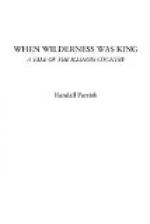At fort Dearborn, near the head
of the
Great Lake. Twelfth
June, 1812.
My dear old friend:
I have come to the end of life; they tell me it will be all over by the morrow, and there remains but one thing that greatly troubles me—my little girl, my Elsa. You know I have never much feared death, nor do I in this hour when I face it once more; for I have ever tried to honor God and do my duty as both man and soldier. David, I can scarcely write, for my mind wanders strangely, and my fingers will but barely grasp the pen. ’T is not the grip of the old sword-hand you knew so well, for I am already very weak, and dying. But do you yet remember the day I drew you out of the rout at Saratoga, and bore you away safely, though the Hessians shot me twice? God knows, old friend, I never thought to remind you of the act,—’twas no more than any comrade would have done,—yet I am here among strangers, and there is no one else living to whom I may turn in my need. David, in memory of it, will you not give my little orphan child a home? Your old comrade, upon his death-bed, begs this of you with his final breath. She is all alone here, save for me, and there is no blood kin in all the world to whom I may appeal. I shall leave some property, but not much. As you love your own, I pray you be merciful in this hour to my little girl.
Your old comrade,
Roger Matherson.
This had been endorsed by another and bolder hand:
Captain Roger Matherson, late of the Massachusetts Continental Line, died at this fort, of fever, fourteenth June, 1812. His daughter is being cared for by the ladies of the garrison.
Nathan Heald,
Capt. First Regt.
Inf., Commanding.
The tears were clinging to my mother’s long lashes as she finished the reading; she was ever tender of heart and sympathetic with sorrow. My father sat in silence, looking far off at the green woods. Presently he took the paper again into his hands, folded it carefully in the old creases, and placed it safely away between the Bible leaves. I saw my mother’s fingers steal along the arm of the chair until they closed softly over his.
“The poor little lamb!” she said gently.
My father’s old sword hung over the fireplace, and I saw his glance wander toward it, as something seemed to rise choking in his throat. He was always a man who felt deeply, yet said but little; and we both knew he was thinking about the old days and the strong ties of comradeship.
The stranger struck flint and steel to light his pipe; the act instantly recalled my father to the demands of hospitality.
“Friend,” he said, speaking firmly, “hitch to the stump yonder, and come in. You have brought me sad news enough, yet are no less welcome, and must break bread at our board. John,” and he turned toward me, “see to friend Burns’s horse, and help your mother to prepare the dinner.”




